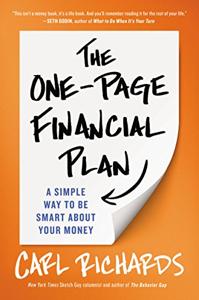
Want to learn the ideas in The One-Page Financial Plan better than ever? Read the world’s #1 book summary of The One-Page Financial Plan by Carl Richards here.
Read a brief 1-Page Summary or watch video summaries curated by our expert team. Note: this book guide is not affiliated with or endorsed by the publisher or author, and we always encourage you to purchase and read the full book.
Video Summaries of The One-Page Financial Plan
We’ve scoured the Internet for the very best videos on The One-Page Financial Plan, from high-quality videos summaries to interviews or commentary by Carl Richards.
1-Page Summary of The One-Page Financial Plan
Overview
Even if you’re not a money-obsessed investor or gambler, you probably think about money more than you’d like to admit. There’s rent to pay and children to feed, which leaves little left over for leisure activities.
You need a financial plan that’s tailored to your life and needs. Making one may sound scary or boring, but it can be fun and help you spend money on the things you value. You’ll find it easier to stick with your plan if you notice how much better your life is after making some simple changes.
You will learn how to use budgeting as a game, why you should take breaks from Amazon shopping carts, and why CNBC is not the best source for investment advice.
Big Idea #1: First you have to discover why money is important to you.
Money is the foundation of a successful financial plan. Before you can build that plan, however, you must answer this question: Why do I want money? Take some time to think about it and put your answer at the top of a piece of paper. You’ll need it later.
Asking why money is important to you helps you define what you value, which in turn will help you develop a financial plan that fits your individual needs. For example, when going to the doctor they first ask what’s wrong with us in order to determine a fitting treatment.
The same goes for financial plans. Knowing why you value money will aid in the examination of your financial situation. Only then can you develop a “treatment” that will work for you. Someone who wants to save money to travel the world and someone who wantsto have a secured pension will likely have financial plans that look totally different from one another. Whereas one might want to invest in an RV, the other might want to invest in a good pension fund. Knowing why you value money also helps you assess whether the way you spend your time reflects your values. Imagine that you value money because it gives you the financial freedom to spend more time with your family. Now imagine that you run an independent business and spend all weekend on Twitter trying to increase your followers so as not be forgotten by people. You spend so much time on Twitter that interrupt dinnertime conversations with your family just reply tweets and check their followers are really living according to their values?
Now that you know why money is important, it’s time to set some goals.
Big Idea #2: Guess what your goals are and fine-tune to reach them.
It’s hard to predict what the future will be like. We can think of financial planning as a vacation, since we have some goals but also leave room for change. For example, if there is bad weather on your planned picnic day, you might want to visit a museum instead.
Financial planning is similar to goal-setting. Your goals can change over time, so be willing to modify them if necessary.
Let’s say that one of your goals is to pay off $40,000 in student loans within three years. You may have a financial crisis and be unable to save as much as you planned. Instead of sticking with your previous plan, you can readjust and settle on paying off $28,000 in the same amount of time.
Once you’ve accepted that the future is unpredictable, it’s time to write down some goals. What should your goals be?
Imagine you were asked why money is important. You might respond, “Money is important because it helps me give my kids the best opportunities and keep them safe.”
Some of your goals could be things like:
In two years, I want to have saved up enough money to pay for my son’s college. Next year, I’d like to send my daughter on a three-month foreign exchange program. And when she comes back from her trip, I’ll set aside some emergency funds in case she doesn’t get a job right away after graduating.





